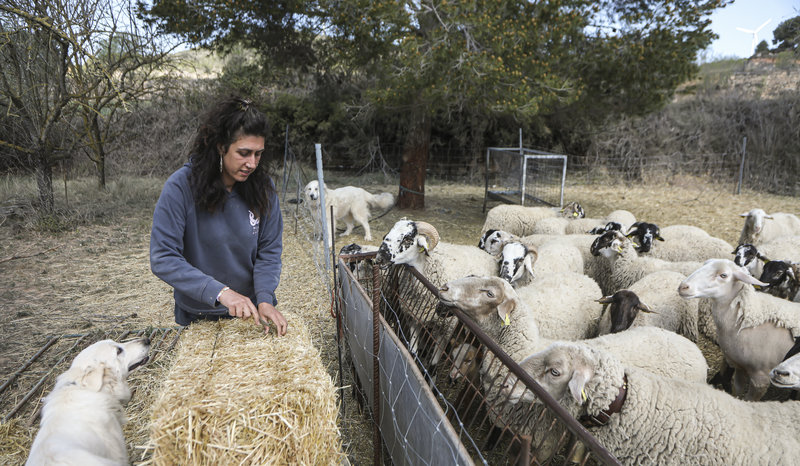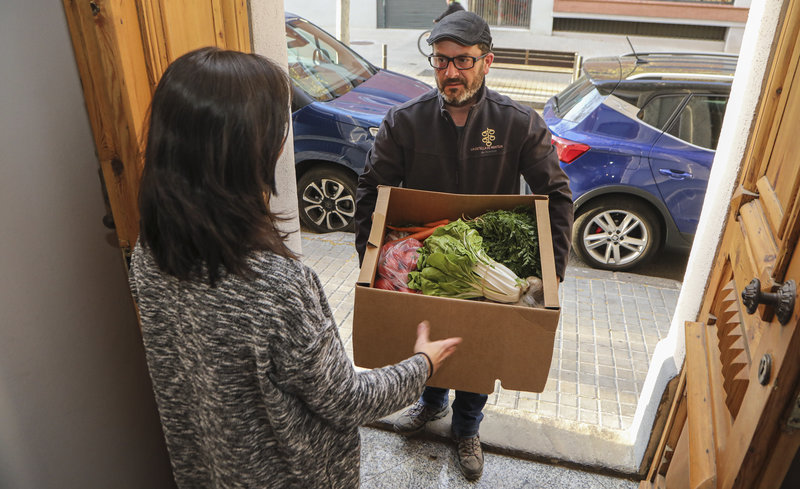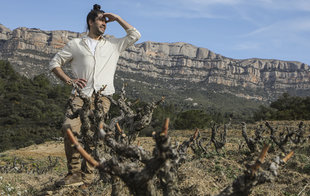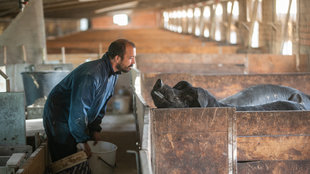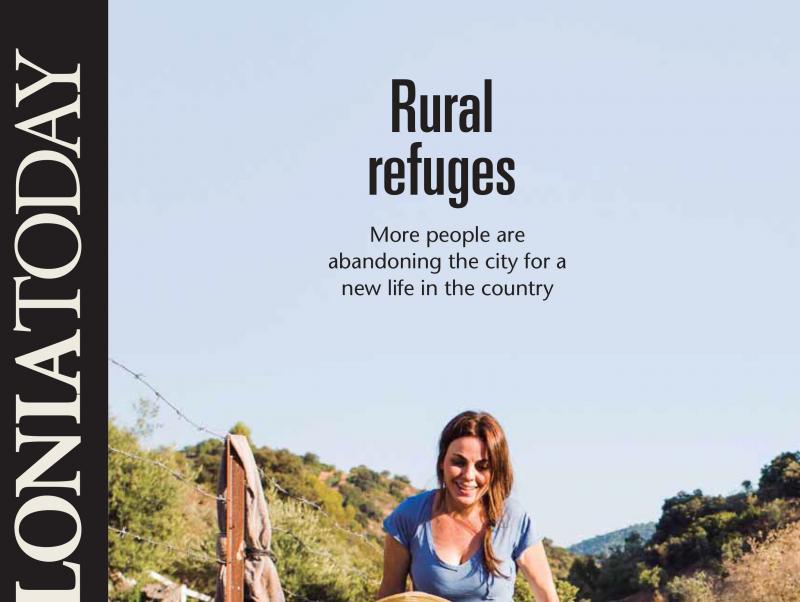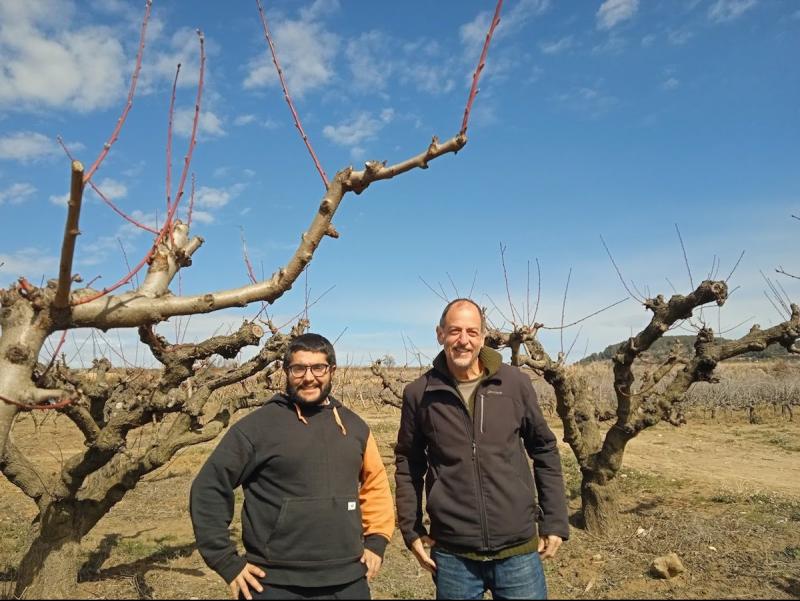Return to rural life
For decades, the countryside has experienced a constant loss of people leaving for towns and cities, but there are also examples of people going in the opposite direction and deciding to go back to a life of living off the land
Everyone we spoke to agreeS that the change to rural life has substantially improved their quality of life
“We work hard, but we do it at the rhythm of nature. It is a feeling of rediscovering the feeling of living”
“Most people have antecedents in the primary sector; not long ago it was one of the most relevant in the economy”
are women
based on data on people starting new employmentyoung people
got grants to move to the country from 2015 to 2021You’ve gone mad!” That was how Anna Coll’s mother reacted when she told her that she had decided to leave Sabadell to become a farmer. At the time, she worked at the Veterinary Faculty of the Autonomous University of Barcelona and her partner, Josep Oriol Pujol, Uri, owned a consulting company. The two of them, with their children Marta and Pere, lived an apparently comfortable life, but they felt ill at ease and were tempted by the idea of a radical change. Things began to happen during the pandemic, when the family decided to spend lockdown in the village of Montgai, in the Lleida county of La Noguera. They had a small allotment there and, little by little, friends and acquaintances began asking them to send them products from the land. That’s how it all started.
One day, the couple took a step that would change their lives when they decided to dedicate themselves to horticulture. They gave up their jobs, left the city for good, and set up La Cistella de Montgai, a small company that produces some 60 fresh products grown on their allotment that they deliver to homes in baskets, often supplemented with eggs from free-range hens, farmhouse loaves and honey. They have managed to build up a loyal clientele who never fail to place an order with them every fortnight. They also have their own stall at the local market, which is a good way of reaching more local people. In all, the couple now manage almost 5,000 square metres spread over several estates and they also have a small farm for self-consumption where they can also welcome visitors. It has been three years since they first embarked on this new adventure, and only a few days ago the mother who had initially been so sceptical admitted: “Your children look happier than they did here in Sabadell!”
Anna and Uri are examples of some of the young people who have moved into the primary sector in recent years. There are no reliable statistics on the number of new farmers, but data from the Department of Climate Action covering 2015 to 2020 says that 2,146 young people benefited from some kind of government help to make this leap, and almost 500 more applied for aid in 2021 and 2022. Even with institutional support it is something of a leap in the dark, although all the people we spoke to for this report agree that the change has substantially improved their quality of life.
Julià Prunera worked in the construction sector for 20 years before he decided to begin managing an olive grove and a turkey farm between Bovera and Granadella in the Garrigues county in Lleida. Erik Espuña left Barcelona and together with his partner, his mother and a friend took over a company dedicated to horticulture and turned it into La Tomakera, in the village of Cabrianes, in Sallent, in the county of Bages. Mireia Masalias and Israel Rodríguez did not have stable jobs and suddenly found themselves working as shepherds, one in Solivella and the other in Esparreguera. Pol Cubells, together with his partner Clara, decided to enrol in the Jaume Ciurana School of Enology and Viticulture in Falset and then began managing the family vineyards while launching a micro-wine project. And, finally, Pino Delàs used to be employed in a public works company until and at the age of 39 (at the limit of what counts as a young farmer) he decided to set up Llavora, a company in Ventalló, in the Girona county of Alt Empordà, that sells organic pork products.
Motivations
Nevertheless, it cannot be denied that for decades the countryside has been subject to a continuous rural exodus. In the prologue of his 1902 book, La vida al camp (Country Life), the illustrious writer, Jacint Verdaguer, complained about the rivers of people coming down from the mountains and crowding into the cities. Those rivers of people that Verdaguer described did not stop, quite the opposite. In a matter of decades whole villages had been left deserted and farms abandoned, so that the primary sector came to account for just 1% of the country’s workforce. In the meantime, there have been several attempts to get people to return to the countryside, although more often than not they have been more symbolic than effective.
However, today a new concept has emerged, that of the neo-farmer, a term that defines a person who decides to give up their occupation to go and earn a living in the countryside, often without any family traditions to draw on. Many of these new farmers, like Anna and Uri, do it out of a desire to improve their quality of life, while in other cases they are people are guided by an idea of returning to nature to carry out a project linked to respect for the environment and with a vocation to innovate.
Pol, who left Barcelona to move to the region of Priorat, talks about the satisfaction of having “detoxified myself from the rhythms of the urban system”. “Perhaps it took me four years to reconnect with the essence of living. Here it doesn’t matter if it’s Monday, Friday or Sunday. We work hard, but we do it at the rhythm of nature. This is the great paradigm shift,” he says, adding: “It is a feeling of being reborn and rediscovering the feeling of living.”
Laura, Jordi, Erik and his mother all wanted to get involved in the social and solidarity economy and to make a change in their lives, and so they set up La Tomakera company. The first was a dentist, the second was a chemist, the third was an environmentalist, and the last was an unemployed supermarket manager. Now, the four of them together manage a 2.5-hectare farm, which includes a hectare of arable land and a small farm of 34 geese. Erik stresses that he sees a future in the organic sector: “I want to fight for this life, both for the bucolic side of it and because of political, personal and socio-economic convictions,” and he adds that “we need to repopulate the villages as the cities will become more and more difficult to live in”. Whatever their motivations, all the people we spoke to insist that they are satisfied with the change they made and that they would never consider going back to their former lives.
Renewed traditions
Sometimes, this new generation of farmers are recovering a family legacy, as in the cases of Julià or Pol. For others, the new experiences mean more or less starting from scratch, as in the case of Anna and Uri, who merely had the family garden and the memory of grandparents who many years ago had managed a farmhouse. Nevertheless, Pino points out: “Most of society has antecedents in the primary sector. Not so long ago, the primary sector was one of the most relevant in the economy.”
In the case of Pol and his partner, their experience has been about recovering the family vineyard that their grandparents had to abandon many years ago. Pol had never completely lost contact with the family vineyards, even if at harvest time it just meant “picking a few boxfuls of grapes,” he says. To this can be added another motivation that is generally shared by all of those who decide to move into the primary sector: “My partner and I have always been very fond of nature and working in an office in Barcelona and the pace of city life just didn’t suit me.” Finally they realised that the best thing would be to try and renew the family tradition: “The answer was in front of us but we didn’t see it because I grew up under the generational paradigm that the countryside equals poverty, that you can’t make a good living there, and that the best life depended on studying and training and then living in the city. But that’s false; there is no real quality of life in the city.”
Pol is pleased with how the family reacted, especially his grandfather: “It’s changed his old age to see that his grandson, out of nowhere, is running the family vineyards, buying land and earning the recognition of the locals. It has given him a new lease of life!” He speaks with satisfaction about how the townspeople began to see them as “the only young people” continuing the local legacy, “because so many young people from here don’t want to know anything about the countryside.” Their efforts also encouraged the older generation in the village to start leasing vineyards to them, and they so far have leased 15 hectares. They also began to buy the plots around the family estate so that they now own 35 hectares. The goal is “to recover traditional agriculture, along with the paths, the verges, dry stone walls and native plant species. We are the generation that is thinking about going back to our roots and re-establishing a model of how a dryland Mediterranean vineyard should be planted while respecting the cultural heritage,” he explains.
Pino, together with a business partner, launched Llavora, a company making organic pork products. He says he did so as “a commercial alternative for small farmers, who were being driven to extinction by the process of intensification of the sector,” and as a way of reducing the environmental impact of pig farming at a time when the sector needs to adapt to the scarcity of resources and climate change. The farm where they set up went from having about 2,000 pigs to managing 40 or 50 sows in closed cycle and about 600 pigs a year. Pino is satisfied with the repercussions of the project: “We have reduced the environmental impact, but at the same time we have increased the local economic impact because we have multiplied direct jobs tenfold. And also indirect jobs, because we buy local products, work with local professionals and have even recovered a disused feed mill.”
Despite the satisfaction, the transition from one way of life to another is not simple, which both Anna and Uri acknowledge: “The first year was the hardest, especially because while the allotment was working and we were selling baskets, we still had one foot in our former lives.”
Mireia Masalies also found it tough at first, especially as she became a mother at the same time as she began to devote herself to keeping sheep. “My son and my project are the same age,” she says. Israel Rodríguez, who started working as a shepherd six years ago, remembers that the first few weeks were very hard, “because you feel like you’re a slave”, but he adds that he sees himself continuing with the job as long as he can find someone to relieve him so that he can have some free weekends. Currently, he lives off the lambs he sells, the subsidies he receives and a contract with the Collbató local council to maintain perimeter strips of forest and undergrowth. Although his family works in the primary sector, Julià openly admits that “the change has been tremendous”: “Before I was in charge of about 20 construction workers and I had a fixed timetable. I now spend more hours working and I’m often more physically tired, but psychologically I feel much better.”
Bureaucratic spider’s web
People who want to get into the primary sector can apply for help from the Department of Climate Action. However, the beneficiaries complain about the amount of bureaucracy that must be overcome to get this aid, despite having the support of the sector’s unions. Pol describes spending hours on the computer and doing tons of paperwork and he says that “the aid issue is a big mess with so many clauses and requirements that it makes it very complicated, and even unfeasible, for just about anyone.” They also complain that the financial support arrives late, when the project is already underway, which forces them to resort to loans or help from the family. Julià explains that without the support of his family it would have been almost impossible for him to get started, and Mireia also points out that “right now my parents are supporting me”.
Apart from the bureaucratic difficulties, Pino, who used to work for the Small Farmers Union and who is now just a member, points out that “the financial support from the authorities is poorly designed” because it does not respond to the needs of new farmers. In highlighting the deficits, he also points out that “it lacks continuity, the subsidies do not arrive until many months after they are supposed to, and the training courses do not always respond to the needs of the producer”.
Feature Country life
Feature Country life

